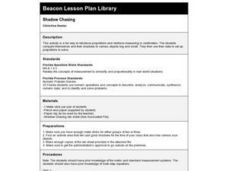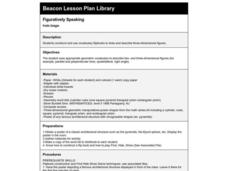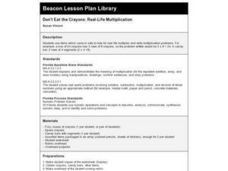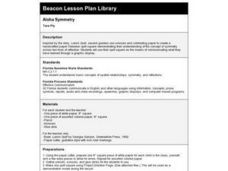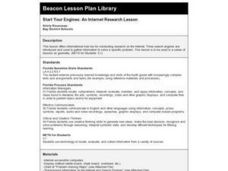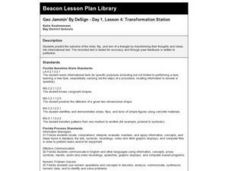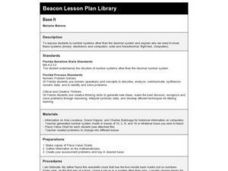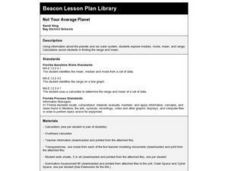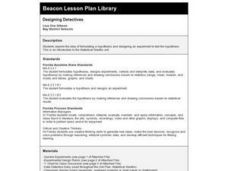Curated OER
Shadow Chasing
The students compare themselves and their shadows to various objects big and small. Students use their data to set up proportions to solve.
Curated OER
Reinforcing Fractions Using a Fraction Calculator
Students complete fraction word problems using TI-Explorer Calculators.
Curated OER
We're Alike, We're Different!
Students compare a variety of people counters to determine how they're alike and different and then sort, classify and write about how they sort and classify people counters.
Curated OER
Figuratively Speaking
Third graders construct and use vocabulary flipbooks to draw and describe three-dimensional figures. They utilize worksheets and access websites imbedded in this plan which help them construct their books.
Curated OER
Don't Eat the Crayons: Real-Life Multiplication
Third graders use items which come in sets to look for real-life multiples and write multiplication problems. This lesson assess the student's understanding of the meaning of multiplication using an array model and manipulatives.
Curated OER
Symmetry Monsters
Students discuss and study the word symmetry. They examine letters of the alphabet, shapes, and artwork and decide if they are symmetrical or not. Then they create their own symmetry monsters.
Curated OER
Names Count!
Second graders work in small groups to complete a graph and use data to determine range, mode, and median. They use the number of letters in their names and in fairy tale characters names to produce their data. This is a fun lesson!
Curated OER
Aloha Symmetry
Students create handcrafted paper Hawaiian quilt squares. They do this to show the concept of symmetry across two lines of reflection.
Curated OER
Water Bucket Relay
Third graders, in teams, play a subtraction game called Water Bucket Relay.
Curated OER
EBT-rimental
Students engage in a instructional activity that gives them the tools needed to become knowledgeable credit consumers. The companion website for the ITV program TV-411 is used to provide learners with an interactive experience of what...
Curated OER
Start Your Engines: An Internet Research Lesson
Fifth graders engage in a lesson which offers informational how-tos for conducting research on the Internet. Three search engines are introduced and used to gather information to solve a specific problem.
Curated OER
Number Chameleon
Students complete a worksheet in which they study the relationships between fractions, decimal, and percents.
Curated OER
Geo Jammin' By DeSign - Day 1, Lesson 4: Transformation Station
Second graders manipulate triangles to discover the concepts of slides, flips and turns of a geometric shape.
Curated OER
Rock On!
Fourth graders make models of igneous, metamorphic, and sedimentary rocks out of different types of candy and cookies.
Curated OER
Fraction Fun
Students practice identifying common fractions using various manipulatives. They visit a visual fractions website and complete an activity. In the final activity, students create real-life problems.
Curated OER
Common Sense Cookie Shop
First graders shop for a bag of cookies using toy money. In teams, they choose which variety to buy and decides which bills and coins are necessary to buy the bag of cookies and a cashier makes change. They tally the cookies purchased...
Curated OER
Base It
Third graders complete place value charts in the decimal system, the binary and Hexadecimal system. They discuss the contributions made by Ada Lovelace to computer language. They express the idea of place value with exponents.
Curated OER
Who Wants to Carry a Million?
Students, in groups, determine the volume of a box large enough to hold a million dollars. They calculate the dimensions of a bill and the volume of the money.
Curated OER
Quandaries, Quagmires, and Quadrilaterals
Students classify, flip, slide, and turn a quantity of quadrilaterals.
Curated OER
Not Your Average Planet
Fourth graders explore median, mode, mean, and range using information about the planets and our solar system.
Curated OER
Designing Detectives
Third graders explore the idea of formulating a hypothesis and designing an experiment to test the hypothesis.
Curated OER
Toothpicks, Gumdrops, and Polyhedrons
Sixth graders use toothpicks and gumdrops to make prisms and pyramids. This helps them explore the relationship betweeen faces, vertices, and edges.


